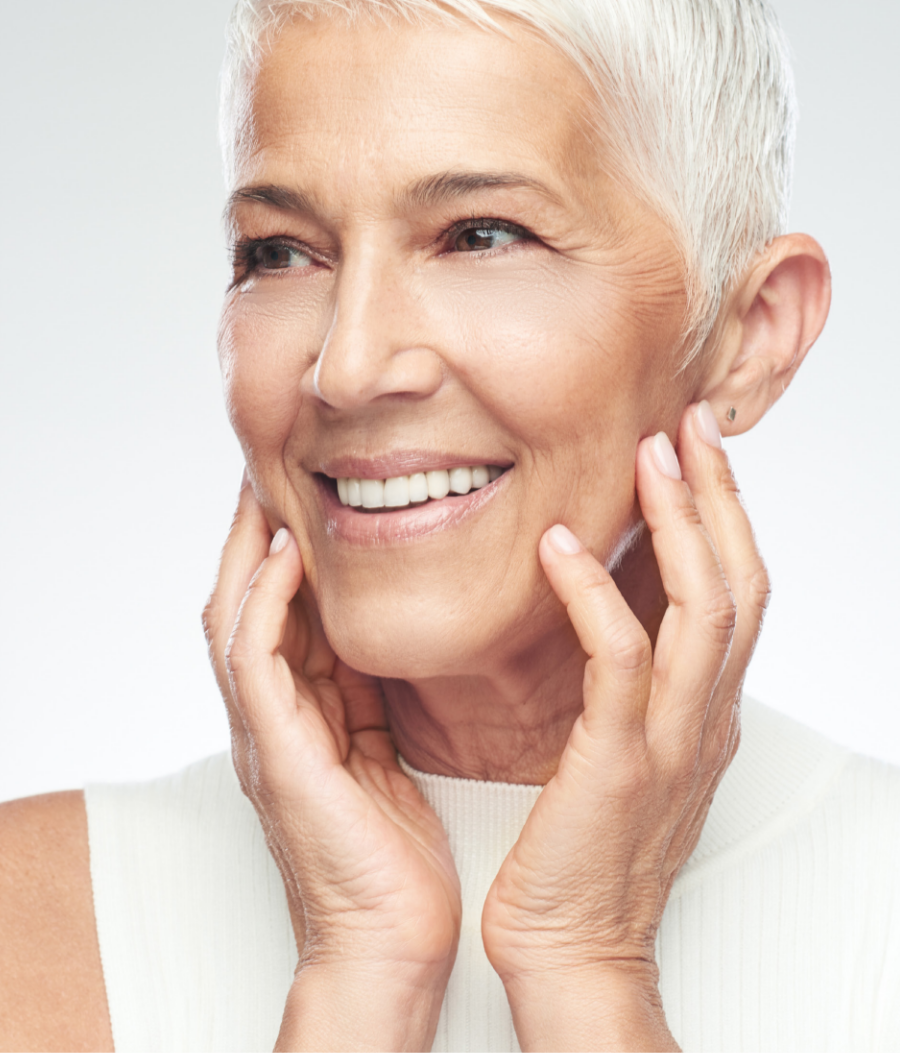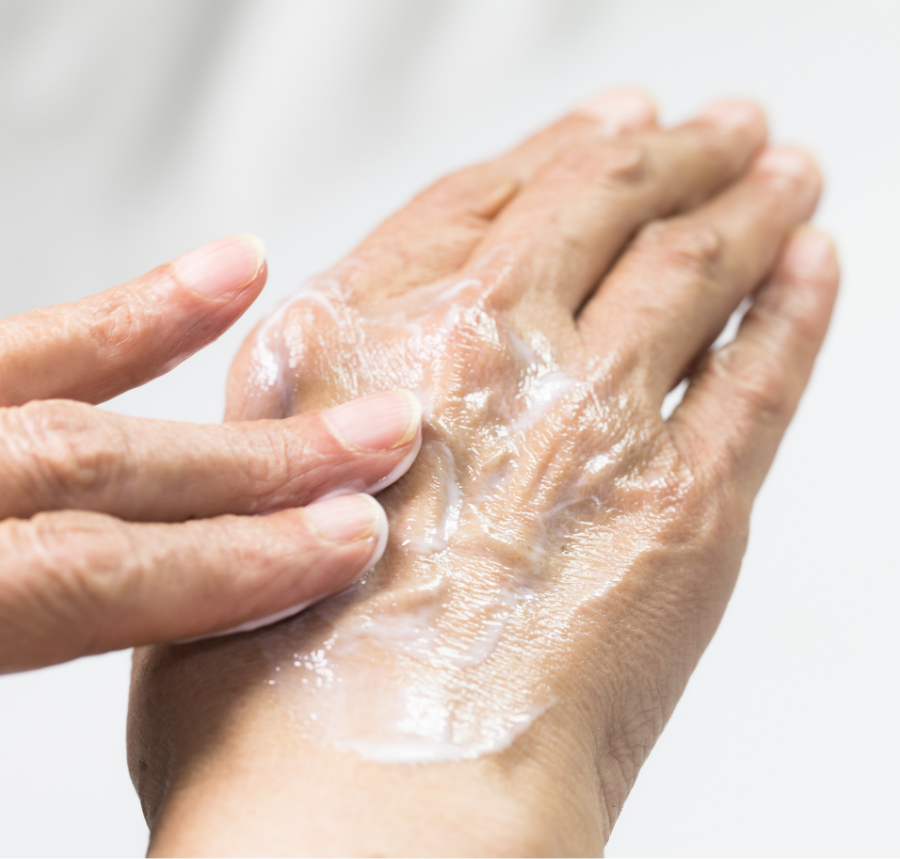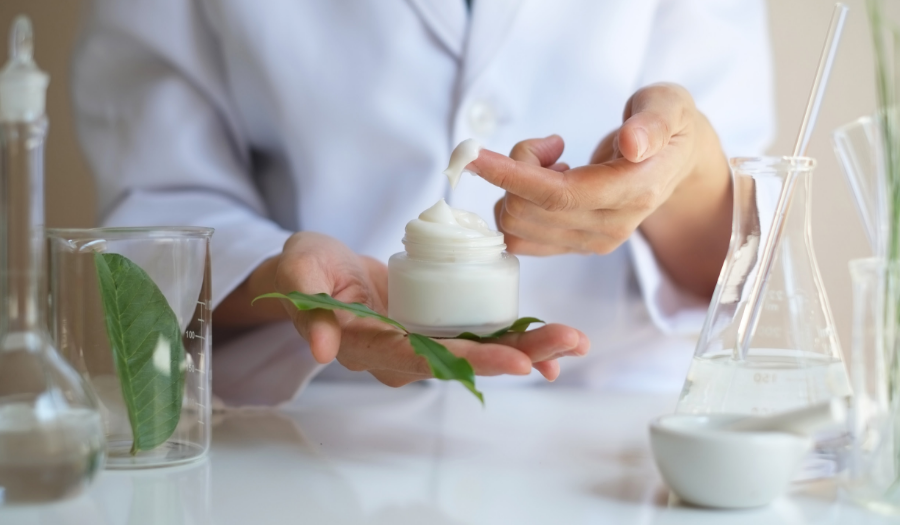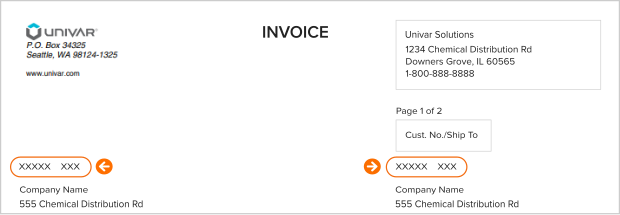We’re here to provide you with more information or help answer any questions you might have. Send us a note and we’ll get back to you as soon as possible.


The term “anti-aging” in the skincare industry has always been a loaded one, to say the least. We live in a world that puts a high value on keeping a youthful-looking appearance, which has led to a booming anti-aging cosmetics market that, according to Fortune Business Insights, is estimated to be valued at more than $60 billion by 2026.
As we age and our skin visibly changes, we tend to start demanding the impossible from our skincare. While anti-aging products cannot rewind the clock, they can help achieve healthy-looking skin reminiscent of a youthful glow.
In this article, we’ll discuss what exactly anti-aging skincare is, which ingredients have anti-aging effects, as well as some tips for formulating your own anti-aging skincare line.
What Is Anti-Aging In Skincare?
Anti-aging skincare products are aimed at helping the consumer achieve youthful-looking skin by using ingredients that prevent or reduce the signs of skin aging. The rate at which your skin shows age depends on many different factors, such as your genetics, your environment, and your skincare habits (details below).
In reality, there’s no magic product out there that can completely halt or reverse your skin from aging. It’s a normal and natural process that we all go through, and, luckily, “anti-aging” has been a term that’s been under much scrutiny over the last few years. For that reason, many skincare professionals use the term “ageless” skincare instead.
Ageless skincare can serve the same purpose as anti-aging skincare, but it's backed by the idea of helping consumers achieve their best skin no matter their age. For the sake of this article, we will use the two terms interchangeably.




Why Does Our Skin Change as We Age?
There are many influences that can determine the visible changes that begin to appear as you age. Here are the five factors that cause skin aging:
Intrinsic: This refers to the normal aging process that happens with the passage of time and can appear as fine lines, dry skin, and a loss of elastin. How these changes take shape on your skin is often associated with genetics.
Extrinsic: This is how your skin ages based on external factors such as exposure to the sun, pollution, and blue light. Oxidative stress (an imbalance of free radicals and antioxidants in the body) plays a major role in extrinsic aging, which will be handy to know when we discuss different ingredients below! Photoaged skin (skin aged by the sun) may have deep-set wrinkles, hyperpigmentation, dark spots, and appear thicker than normal.
Hormonal: Estrogen plays a big role in collagen production and in controlling hydration. So when someone goes through menopause, that drop in estrogen production can cause faster skin aging and appear as sagging skin.
Lifestyle: Your day-to-day life can greatly affect your skin! Stress, smoking, diet, and exercise can play a huge role in aging skin faster.
Catabolic: Lastly, some skin aging is caused by chronic diseases, such as hypothyroidism, cancer, or diabetes.
Reduce the Appearance of Wrinkles
Crow’s feet, fine lines–what have you. When you think of the main signs of skin aging, most people think of wrinkles. These creases in our skin are a very natural part of aging, and yet it’s what most consumers want to reduce on their faces.
Our skin is composed of elastin and collagen fibers, which offer support and elasticity (smoothness and firmness). As collagen diminishes, our skin loses this firmness and begins to sag. As a result, jowls, frown lines, and/or deep-set wrinkles (wrinkles that are there even when you’re not smiling or squinting) may appear.
Studies show that people who menstruate have the sharpest decline of collagen, with their skin losing around 30% of its collagen supply during the first five years of menopause.
Ageless skincare uses clinically proven ingredients to boost collagen and elastin with the aim to thicken the skin and reduce the appearance of wrinkles. It also uses ingredients that defend against extrinsic factors that speed up the process of wrinkle formation.
Reduce Inflammation In the Skin
Inflammation is a lesser-known concept to consumers when they go searching for ageless skincare. Inflammation is your skin’s natural defense mechanism to help protect and repair your skin–such as a pimple, swelling, or sunburn.
When inflammation happens over and over again, it accelerates the aging process of your skin and leads to oxidative stress (which, in turn, accelerates the aging process). This is often referred to as “inflammaging.” Many topical anti-aging products you see on the shelves include antioxidants that combat oxidative stress, further reducing inflammation. There’s a diverse range of antioxidants to choose from and while they all technically perform the same function of protecting your skin from oxidative stress, your choice can depend on the goal of the skincare products. Vitamin C is a popular choice among many and it works well with fellow antioxidants such as vitamin E and ferulic acid.
However, it’s important to note that inflammation isn’t always a bad thing. Some anti-aging treatments–such as peels, lasers, micro-needling, and retinoids–actually cause an inflammatory response in order to get the skin to send those signals to protect and repair your skin—like a controlled fire in forest management.
Protecting your skin in this way is ageless skincare for the long term. If you can prevent oxidative stress throughout the years, you have a better chance of preventing wrinkles and other signs of skin aging from forming down the line–or at the very least, minimizing their appearance as the years go by.
Improve Skin Tone & Prevent Discoloration
If you’ve been a fan of the sunshine your whole life but rarely use sunscreen, your skin will likely develop age spots, discoloration, and hyperpigmentation as you get older.
Age spots are also referred to as liver spots or sunspots, and they are small dark areas on your skin that vary in size. They can appear all over the face or body and typically appear in adults over the age of 50.
If you’ve visited a dermatologist to rule out that any of the age spots are cancerous or precancerous, you can reduce the appearance of these age spots through creams and serums formulated to even skin tone.
Prevent the Need for Dermal Procedures
It should be shouted from the rooftops that prevention is the best way to prolong a youthful complexion and healthy skin. Using sunscreens, creams, serums and other anti-aging skincare items before the signs of skin aging appear is not only a long-term solution but also a less expensive approach to achieving the glowing skin of your dreams throughout the years.
It’s the less expensive route because dermal procedures (also known as minimally invasive produces, such as lip or cheek fillers) tend to be “needed” (or better: desired) when the signs have already appeared and cannot be undone or reduced with topical creams. The average cost of dermal fillers ranges anywhere from $700 to $1000+.
That’s why an anti-aging skincare line is great for all ages in adults.


1. Oxybenzonen
It’s been said that prevention is key to achieving that anti-aging effect. That begins with sunscreen. Photoaged skin (skin aged by the sun), as mentioned, can cause age spots, hyperpigmentation, and can break down collagen, as well as lead to more serious effects such as skin cancer. Regular use of sunscreen will help prevent those issues, protecting your skin for years to come. That’s why any morning anti-aging skincare regimen should always include sunscreen. Whether you want to create or use a chemical sunscreen, a tinted sunscreen, or a different type of sunscreen is up to you–but you can reach for ingredients like avobenzone, octinoxate, and oxybenzone.
2. Peptides
Peptides are strings of amino acids, which are the building blocks of proteins in your body needed for not only new collagen but also elastin fibers. Without these proteins, our skin is prone to wrinkles. That’s why peptides have been proven to be effective at producing an anti-aging or anti-wrinkle effect.
3. Retinol
Retinoid was mentioned under the “inflammation” section, but there’s a natural over-the-counter type of retinoid that’s very popular in anti-aging skincare: retinol. This ingredient converts to retinoic acid—an active form of vitamin A—in the skin.
This powerhouse ingredient has been shown to reduce fine lines and wrinkles, improve skin tone, and increase collagen production–all the anti-aging must-have benefits listed above.
The key to using this ingredient lies in the formulation in order to make it consumer-friendly. It’s important to find retinol that incorporates antioxidants (such as vitamin C, silymarin, or bakuchiol) and soothing ingredients (such as hyaluronic acid), so it doesn’t irritate the skin
4. Niacinamide
Niacinamide, also known as vitamin B3, works to brighten and smooth the skin, reduce hyperpigmentation, and calm inflammation. In fact, one study published in 2004 in the International Journal of Cosmetic Science shows that when 50 women applied a moisturizer containing 5% niacinamide to one half of their face and a placebo moisturizer to the other half for 12 weeks, the halves of their faces receiving niacinamide had significant improvements in hyperpigmentation spots, fine lines, and wrinkles compared to the control side.
5. Ceramides
How the skin is formed is often compared to brick and mortar–with skin cells being the bricks and ceramides as the mortar. That’s to say that ceramides are a key player in healthy, robust skin! Ceramides hold the skin together in a protective layer to help defend against environmental stressors such as pollution, UV rays, and much more.
In your youth, your skin has loads of ceramides to keep the skin healthy and supple. But, as you age, as we saw with collagen, the quantity of ceramides drops, leading to drier, rougher skin. Adding ceramides to skincare can help replenish ceramides in the skin and keep it hydrated, firm, and supple!
6. Glycolic Acid
Glycolic acid is a popular alpha-hydroxy acid (AHA) that works as a chemical exfoliant to remove dead skin cells and reveal youthful skin underneath. Originating from sugar cane, it’s the smallest AHA, so it's the most effective at getting into the skin.
Glycolic acid is helpful for reducing hyperpigmentation but can also be used in skincare for combatting fine lines and wrinkles. When formulating with this ingredient, it’s good to know that over-the-counter products typically contain 5% to 7% and can be used a few times a week.
7. Lactic Acid
Lactic acid is another AHA but is sometimes referred to as a gentler version compared to other chemical exfoliants on the market. An isolate from the compound from sour milk, it dates back to Ancient Egypt when Cleopatra bathed in milk for softer skin. More recently (in 1996), researchers found that formulations with 12% lactic acid resulted in fewer fine lines and wrinkles
8. Hyaluronic Acid
A holy grail ingredient, hyaluronic acid (also commonly known as “HA”), is naturally occurring in the human body. It acts as a magnet for moisture, pulling it into the skin and helping your cells retain as much of it as possible.
When skin is more hydrated and moisturized, it may look fuller and plumper! Many people love reaching for HA-infused skincare products to give them the fresh, youthful look they seek. In addition to topical creams and serums, it’s also used in anti-aging treatments such as hyaluronic acid fillers, which are used to fill in areas of the skin like the undereye area.
Formulate Anti-Aging Skincare Products With Us
Whether you refer to these products as “anti-aging,” “ageless,” or another term altogether, you can create your own formulations with these proven ingredients when you partner with Beauty Ingredients by Univar Solutions.
Shop Ingredients for Anti-Aging Skincare Products
From ingredients that focus on reducing the appearance of fine lines and wrinkles to antioxidant-packed regimens that prevent and reduce sun damage and inflammation, no other distributor can match our breadth and depth of knowledge of beauty and personal care ingredients and technologies. Browse ingredients and start formulating your newest innovation today.




Contact Beauty Ingredients for Formulation Support
We’re here to connect you with world-class ingredients through our beauty lens. So if you are an indie or small cosmetic or skincare brand, formulator, or chemist looking for information about the latest ageless cosmetic trends and ingredients, get in touch to find out how we can cater to your needs when formulating.
Tunnel car washes can be broken down into two sections:
Tunnel car wash cleaning – This first section gets all the soil and organic materials off the car. It uses surfactants to reduce the water's surface tension so that water droplets lay flat to get better coverage to clean the car with optimal results. It sets the vehicle up for a shiny, durable protection layer on the finishing side.
| Tunnel Car Wash Cleaning Applications | |
| Bug Remover | Base, anionic surfactants, nonionic surfactants, chelating agents, anti-redeposition agents, solvent |
Wheel Cleaner | Base, anionic surfactants, nonionic surfactants, chelating agents, anti-redeposition agents, solvent |
Alkaline/High pH Presoak | Base, anionic surfactants, nonionic surfactants, chelating agents, anti-redeposition agent |
Boosters | Boosters can be used to customize presoaks or add additional capabilities |
Low pH Presoak | Acid, anionic surfactants, nonionic surfactants, anti-redeposition agent |
Neutral Foamer | Anionic surfactants/amphoteric surfactants, chelating agents |
Conditioner | Anionic surfactants/amphoteric surfactants, dye, fragrance, chelating agents, or ph adjustment |
Tunnel car wash finishing – This second section of the process involves polishes, protectants, and waxes to create more surface tension changes for droplets at the end of the wash. A more hydrophobic surface is needed so the droplets will bead up for effective drying. These are options for consumers to select as service package add-ons that are regularly not included with a car wash.
For example, triple foams provide more color fragrance, or top packages have more protectants, which last for about a month. Silicone resins and functional silicones protect the car for a glossy, smooth finish and help with durability by offering increased resistance to micro scratches and debris on the road.
| Tunnel Car Wash Finishing Applications | |
| Polish | High levels of foam using amphoteric surfactants, color, and fragrances. Contains a gloss agent: silicone or wax emulsion |
| Carnauba Wax | carnauba emulsion, amphoteric surfactants |
| Rain Protectant | silicone emulsions, cationic surfactants, amphoteric surfactants, nonionic surfactants, EB |
| Ceramic Seal | silicones - amino functionals, cationic surfactants, amphoteric surfactants, nonionic surfactants, EB |
| Drying Agent | Mineral seal oil, nonionic surfactants, cationic surfactants, EB |
| Tire Shine | Silicone (PDMS), wetting agent, rheology modifier, either solvent or water, and emulsifier) |
| Spot Free Rinse | RO Water |
For tunnel car wash equipment performance, it's about striking a balance to ensure the vehicle is cleaned best BEFORE the finishing process. Otherwise, it will magnify and preserve the dirt under these protective layers. Since both applications are doing different things with the surface tension, facility owners need to be sure that the second part of the process begins at the right time to make vehicle surfaces more hydrophobic and shed water rather than further spreading it out.
Resources
References:
Aquabio, Car Wash History: From Simple Beginnings to Modern Day Features: https://aquabio.co/uncategorized/blog/car-wash-history-from-simple-beginnings-to-modern-day-features/
Automatic Vehicle Wash, Tunnel Systems: https://avwequipment.com/equipment-category/tunnel-systems/
Carwash.com, 5 long-lasting benefits of carwashing: https://www.carwash.com/5-long-lasting-benefits-carwashing/
Carwash.com, Going green: Save electricity, water and money: https://www.carwash.com/going-green-save-electricity-water-and-money/
Carwash.com, Lessons in carwash tunnel layout: https://www.carwash.com/lessons-carwash-tunnel-layout/
Detail Pro POS, 20 Car Wash Statistics in 2021 That Will Surprise You: https://www.detailpropos.com/blog/car-wash-statistics/
Focusedcarwash.com, Car Wash Industry Statistics: https://focusedcarwash.com/wp-content/uploads/2017/09/industry-statistics.pdf
How It Works, How does a car wash work?: https://www.howitworksdaily.com/how-does-a-car-wash-work/
JBS Industries, 10 Trends You Should Know About the Car Wash Industry: https://www.jbsindustries.com/blog/10-trends-you-should-know-about-in-the-car-wash-industry/
JBS Industries, Best Car Wash Add-Ons: https://www.jbsindustries.com/blog/car-wash-add-ons/
PSD Codax, Tunnel Car Wash Systems - A Beginner's Guide to Tunnel Car Wash Systems: https://www.psdcodax.com/tunnel-car-wash-systems-a-beginners-guide-to-tunnel-car-wash-systems/
Sunset North Car Wash, Here's What (Tunnel) Car Washes Are Really Doing to Your Car: https://sunsetnorthcarwash.com/2022/11/28/heres-what-tunnel-car-washes-are-really-doing-to-your-car/
Synchrony, 5 Reasons to Visit the Car Wash - and What to Watch Out For: https://www.mysynchrony.com/blog/automotive/5-reasons-to-visit-the-car-washand-what-to-watch-out-for.html
Thompson Sales Company, Wash Your Car Yourself or Take It Somewhere: https://www.thompsonsales.com/wash-your-car-yourself-or-take-it-somewhere/
Tommy's Express, Do clean cars improve gas mileage?: https://tommys-express.com/blog/do-clean-cars-improve-gas-mileage/
Way.com, Tunnel Car Wash - All you need to know: https://www.way.com/blog/tunnel-car-wash-all-you-need-to-know/
Way.com, All you need to know about clean cars and fuel efficiency: https://www.way.com/blog/clean-car-and-fuel-efficiency/
Western Carwash Association, Water Conservation: https://www.wcwa.org/page/WaterConservation






